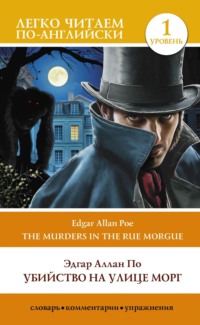Kitobni o'qish: «Убийство на улице Морг. Уровень 1 / The Murders in the Rue Morgue»
© С. А. Матвеев, адаптация текста, коммент., упраж. и словарь, 2023
© ООО «Издательство АСТ», 2023
The Murders in the Rue Morgue

We can hardly analyse our mental features1. We appreciate them only in their effects2. We know, that they are a source of the largest enjoyment. As the athlete finds his delight in the hardest exercises, so the analyst finds pleasure in enigmas, conundrums, and hieroglyphics. An ordinary man thinks that it is just magic. The wonderful results have, in truth3, the whole air of intuition.
The faculty of resolution can possibly exist thanks to the mathematical study, and especially to that highest branch of it which is called analysis. But to calculate does not mean to analyse. A chess-player, for example, calculates but he does not analyse. So the game of chess is greatly misunderstood. I am not now writing a treatise, but I am sure that the game of draughts4 is much cleverer than chess. In chess, what is only complex is mistaken (a not unusual error5) for what is profound. The most important thing here is attention. If an oversight is committed, there is a defeat. The chances of such oversights are multiplied; and in nine cases out of ten6 it is the more concentrative rather than the more acute player who conquers. In draughts, on the contrary, where the moves are unique, less attention is required. To be less abstract-let us suppose a game of draughts where the pieces are reduced to four kings7, and where, of course, no oversight is to be expected. It is obvious that here the victory can come only by the good movement, the result of some strong exertion of the intellect. The analyst tries to understand the spirit of his opponent, identifies himself therewith8, and very often sees thus, at a glance9, the sole simple methods by which he may hurry into miscalculation.
Whist10 is famous for its calculating power; and men of the highest order of intellect are known to play it, while eschewing chess as frivolous. Beyond doubt it demands the faculty of analysis. The best chess-player in the world is merely the player of chess; but proficiency in whist implies capacity for success, here mind struggles with mind. I mean that perfection in the game which includes a comprehension of all the sources which lead to the victory. This is inaccessible to the ordinary understanding. To observe attentively is to remember distinctly; and, so far11, the concentrative chess-player will do very well at whist. People think that to play well just means to know how to play. But the analyst makes, in silence, many observations and inferences. So, perhaps, do his companions; and the difference lies in the quality of the observation. Our player examines the face of his partner, comparing it carefully with that of each of his opponents. He notices the cards in each hand; often guessing them through the glances bestowed by their holders upon each12. He notes every variation of face as the play progresses, thinking about the expression of certainty, of surprise, of triumph, or of chagrin.
The analytical power should not be confounded with simple ingenuity; for while the analyst is necessarily ingenious, the ingenious man is often incapable of analysis. Between ingenuity and the analytic ability there exists a difference far greater, indeed, than that between the fancy and the imagination. In fact, the ingenious are always fanciful, and the truly imaginative are often analytic.
The story which follows will prove to the reader these words.
During the spring and part of the summer of 18-, I lived in Paris, and there I became acquainted with a Monsieur C. Auguste Dupin13. This young gentleman was of an excellent family, but, by a variety of some events, lost nearly all his money. He had a small part of his patrimony14; and he managed to survive. Books, indeed, were his only luxuries, and in Paris the books are easily obtained.
Our first meeting was at the library in the Rue Montmartre15, where we both looked for the same very rare and very remarkable volume. After that, we saw each other again and again. I was deeply interested in his family history which he told me. I was astonished at his mind, and I notices the vivid freshness of his imagination. I felt that the society of such a man would be to me a treasure beyond price16. We decided to live together during my stay in the city; and I rented a grotesque mansion in a desolate portion of the Faubourg St. Germain17.
Our seclusion was perfect. We admitted no visitors. Indeed the locality of our retirement was a secret from my friends; and Dupin left Paris very gladly.
My new friend adored the night. So we tried to make the night longer. At the first dawn of the morning we closed all the shutters of our old building. Then we read, wrote, or talked, waiting for the true Darkness. Then we went out, continuing our conversation.
At such times I could not help admiring18 a peculiar analytic ability in Dupin. He seemed, too, to be very proud of it. He boasted to me that most men, in respect to himself, were very simple, and that he could understand them very well. His manner at these moments was frigid and abstract; his eyes were empty. Observing him in these moods, I often thought about two different Dupins-the creative and the resolvent.
Once we looked over an evening edition of the “Gazette des Tribunaux,”19 when the following paragraphs drew our attention.
“EXTRAORDINARY MURDERS.
This morning, about three o’clock, the inhabitants of the Quartier St. Roch20 were aroused from sleep by a succession of terrific shrieks. The shrieks came, apparently, from the fourth story of a house in the Rue Morgue21, where Madame L’Espanaye22, and her daughter, Mademoiselle Camille L’Espanaye23, lived. After some delay, the gateway was broken, and eight or ten of the neighbors entered, accompanied by two gendarmes. By this time the cries ceased; but, as the party rushed up the first flight of stairs, two or more rough voices were distinguished, and seemed to proceed from the upper part of the house. As the second landing was reached, these sounds, also, ceased, and everything remained perfectly quiet. The party hurried from room to room. When the people came to the large back chamber in the fourth story, (the door of which, locked with the key inside, was forced open24,) everybody was struck with horror than with astonishment.








